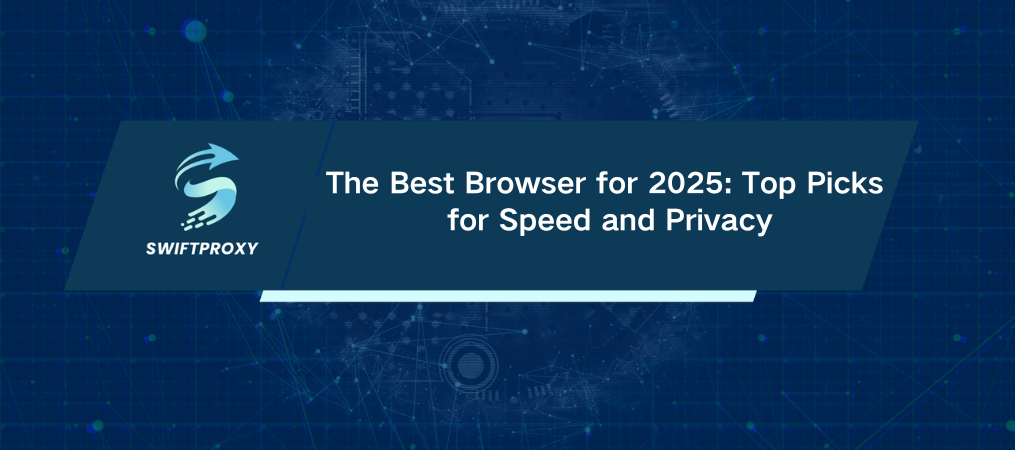The Best Browser for 2025: Top Picks for Speed and Privacy

In 2025, we spend an average of 6+ hours online every day. A staggering amount, right? That's time spent navigating websites, watching videos, and communicating—all through the browser. Yet, as essential as these tools are, not all browsers are created equal. Some are built for speed, others for privacy, and some focus on a seamless, customizable experience. But which one should you choose?
The Evolution of Web Browsing
Remember when browsers were just about reading basic text pages? Fast-forward to today, and they do so much more—they're hubs for everything from video conferencing to online shopping. But where is it headed?
AI is the game-changer. Predictive algorithms already handle tasks like language translation and can even analyze data faster than the human brain. Browsers will integrate smarter features, from automated speech recognition to more intuitive workflows. But don't expect these updates overnight. Small, deliberate changes are key. By rolling out improvements gradually, browsers can stay in sync with user expectations and technological advancements.
As web apps become more complex, browsers will evolve to support advanced workflows and faster, more secure connections. New features like advanced proxies might just redefine speed and privacy, making browsing smoother than ever.
Best Browser for 2025 to Consider
1. Google Chrome: The Versatile Giant
Platforms: Windows, MacOS, Linux, Android, iOS
Pros: Google integration, vast extension library, seamless device sync.
Cons: High memory usage, minimal privacy features, limited customization.
Chrome owns nearly 68% of the browser market. Why? It's incredibly versatile. Chrome syncs effortlessly with Google tools like Drive and Docs, making it a favorite for work and productivity. However, the trade-off is that it can be a memory hog, and don't forget—Google tracks your browsing activity for targeted ads. Want the same features without the tracking? Chromium (Chrome's open-source version) might be worth considering.
2. Microsoft Edge: Lean, Mean, Efficient Machine
Platforms: Windows, MacOS, Android, iOS
Pros: Efficient battery usage, great reading mode, built-in privacy tools.
Cons: Smaller extension library.
Edge has come a long way. Built on the Chromium engine, it's light on system resources and performs well even on older devices. With built-in tools like reading mode and handwriting input, it's perfect for productivity. While its extension library is smaller than Chrome's, it does support Google Chrome extensions.
3. Mozilla Firefox: The Customization King
Platforms: Windows, MacOS, Linux, Android, iOS
Pros: Excellent customization, robust privacy, open-source.
Cons: Inconvenient update process.
Firefox stands out with its unparalleled customization options. From moving toolbar icons to adding unique extensions, Firefox lets you tailor your browsing experience. It's also a privacy champion—blocking trackers by default. If you're a power user who loves to tweak things, Firefox could be your go-to. Just be aware of the occasional hiccup with updates, which might disrupt your browsing for a few seconds.
4. Opera: Speed Meets Privacy
Platforms: Windows, MacOS, Linux, Android, iOS
Pros: Built-in VPN, ad-blocker, smooth multi-device integration.
Cons: High resource usage, occasional speed lag due to extensions.
Opera's one of the most feature-packed browsers. It combines speed and security with built-in tools like a free VPN and ad-blocker. If privacy is a priority, Opera's got you covered. Add in smart features like My Flow (for device syncing) and Workspaces (to organize tabs), and you've got a browser that's built for multitasking. However, its heavy use of extensions can impact speed, so consider your device's capabilities.
5. Apple Safari: Perfect for Apple Users
Platforms: macOS, iOS
Pros: Sleek design, low resource usage, perfect for Apple ecosystem.
Cons: Limited to Apple devices, minimal customization.
Safari is the browser for those who live in the Apple ecosystem. It's fast, energy-efficient, and syncs perfectly across all your Apple devices. It's got a clean, minimalist design and features like "Picture-in-Picture" for video multitasking. But if you're not an Apple user, you'll miss out on those syncing perks, and the customization options are limited.
Boost Your Online Experience with Smarter Browsing Tips
Want to make your browser work even harder for you? Try these tips:
Get an ad-blocker. It'll save you time and protect you from intrusive ads.
Maximize extensions. Find tools that add functionality to your browser—whether that's for productivity, privacy, or speed.
Learn keyboard shortcuts. They'll save you time and keep you more efficient.
Use different passwords for every account. This reduces the risk of a breach.
Clear your cookies regularly. It's a simple way to protect your privacy and speed up your browser.
Use proxies to maintain anonymity and safeguard your IP address. With proxy services, you don't need to worry about encrypting your traffic as they handle that for you.
Conclusion
Each browser offers a unique set of features, making it important to understand your priorities. Do you want speed and integration with Google's tools? Chrome is your best bet. If privacy and customization are more important, Firefox or Opera might be the better fit. If you're an Apple user, Safari could be your go-to for a smooth, streamlined experience.
The best browser isn't one-size-fits-all. Take some time to explore your options and find the perfect match for your needs. And remember, the world of web browsers is evolving fast—stay ahead of the curve by choosing the right one for 2025.

















































